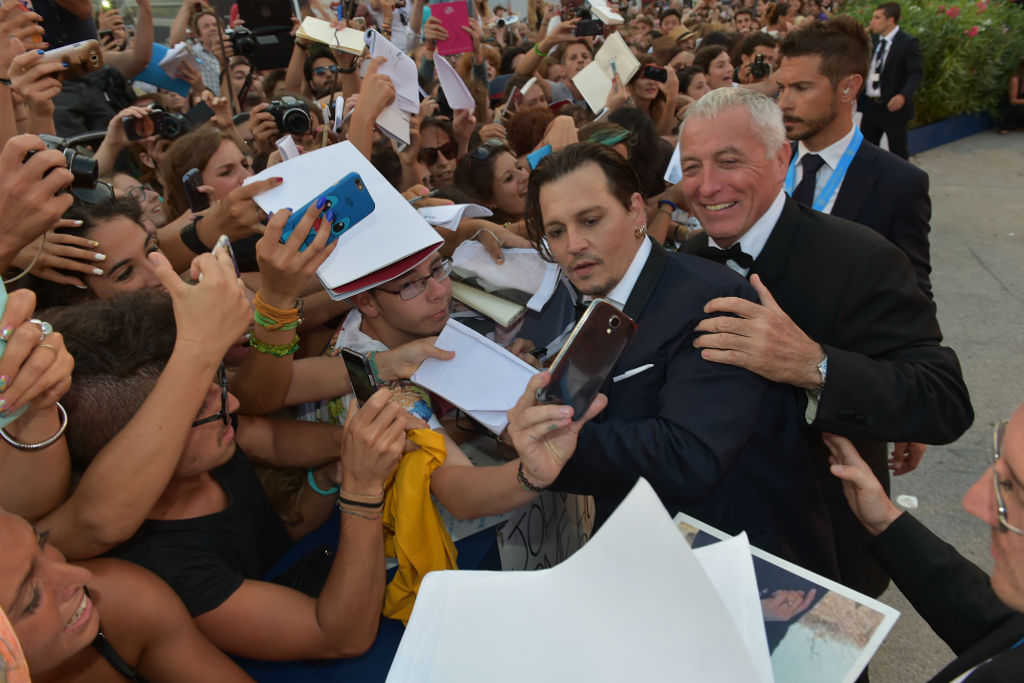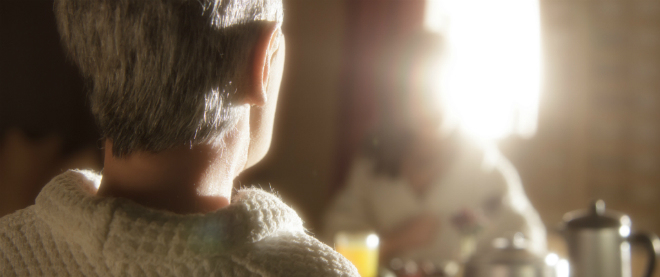‘Everest’, Sad Puppet Sex, And Johnny Depp Eats Dogs: A Venice International Film Festival Round-Up
Johnny Depp sledging Barnaby Joyce yet again wasn't the only good thing to come out of this year's VIFF.

The island of Lido is a fifteen-minute vaporetto ride across the lagoon from the selfie stick-filled main island of Venice, which, I gotta say, makes for a pretty sweet morning commute. Gondola-free, Lido in September boasts leafy villas and a beach lined with scantily clad Italians lazing in hotel beach-boxes. Since 1932, it’s also been home to the Venice International Film Festival, the world’s oldest, and one of the three big international film festivals, trailing Cannes and Berlin.
While critics grumbled about this year’s somewhat middling line-up over many Aperol Spritz, the teenies camped outside the red carpet were euphoric, hankering for their chance to squeal like hamsters at stars such as Kristen Stewart, Tilda Swinton, Shia LaBeouf, Dakota Johnson, and their unanimous favourite, Johnny Depp, in town to premiere the slick but derivative gangster flick Black Mass with fine support from Joel Edgerton.

At his press conference, Depp equally seduced all media present who’d followed his spat with Barnaby Joyce, telling a journalist who asked if he’d taken his dogs for a gondola ride that he “killed his dogs and ate them” after orders from a “sweaty, big-gutted man from Australia.” Other memorable Venice moments included Ralph Fiennes’ manic dance during his photo-call, re-creating three (rare) great minutes from his latest, The Bigger Splash, as well as 16-year-old Australian Odessa Young’s head-turning roles in both Simon Stone’s The Daughter and Sue Brooks’ Looking for Grace, the first Australian film to screen in Competition at Venice for fifteen years.

But red carpet silliness aside, after twelve days, 55 new feature films, and far too many Al Panino festival sandwiches, here’s four of my Venice highlights from art house hits to blockbuster flops.
–
Cold Popcorn: Everest
The Venice Film festival opened BIG, hoping to emulate the opening-night fanfare of past years’ darlings Birdman and Gravity with the world premiere of Everest, a disappointing, star-studded, 3D disaster film directed by Iceland’s Baltasar Kormákur. Taking the Mad Max: Fury Road plot arc of go somewhere, turn around, then try to make it back alive, the $65 million Everest follows a number of high-paying clients, including a mouthy Texan Josh Brolin, hoping to reach the summit when a rogue storm hits. The teams are guided by two rival leaders, the cautious and oh-so-sincere Rob Hall (Australian Jason Clarke) and the charismatic thrill junkie Scott Fisher (Jake Gyllenhaal), who band together to try to get everyone back down alive.
Partly shot on location in Nepal and close to Everest Base Camp at treacherous altitudes, Everest delivers enough stunning snowy visuals – dazzling slope vistas, Mordor-like storm clouds, some fun with helicopters and a heart-stopping vertigo moment when Brolin slips on a ladder bridge – to ensure it should do solid business at Imax. Emotionally, though, the film never quite connects. Based on Into Thin Air, the personal account by Jon Krakauer (who also penned Into the Wild) of the 1996 Everest Disaster, the full pathos of the real-life tragedy is obscured by a dodgy script and hammy character development.
What’s more, the burning question of why someone would pay $65,000 and risk their life to summit the famous peak (over 250 people have died on Everest) is poorly answered by Kormákur. The film stumbles in the icy chaos, its dreams of greatness forgotten.
For fans of: Kiera Knightley and Emily Watson ripping out thick Kiwi accents, Crowded House sing-alongs, Jake Gyllenhaal’s beard, watching nature mess with human dreams.
–
Puppets On Zoloft: Anomalisa

Charlie Kaufman fans will welcome his return to directing after the seven-year break following Synecdoche, New York. The writer of idiosyncratic, morbid, comic-dramas like Adaptation, Eternal Sunshine of the Spotless Mind and Being John Malkovich presents Anomalisa (co-directed by animator Duke Johnson), a crowdfunded stop-frame animation NOT for children, and the festival’s Grand Jury Prize winner. Compared to the bonkers sets and ambitious, postmodern spectacles of his previous work, Anomalisa is far more modest and restrained.
The film’s first half is heavy with Kaufman’s familiar brand of paranoid, existential malaise. Middle-aged, customer-service guru Michael Smith flies into Cincinnati for a night to deliver one of his How May I Help You To Help Them? lectures. To Michael, symbolically suffering from Fergoli delusion, all voices sound alike, be it his wife, the opera on his iPod or his taxi driver – and so Tom Noonan artfully voices every other character (clever, eh?), suffocating Michael in a mundane, homogenised world like that propagated by corporate culture.
He sighs, grimaces, drinks martinis and drags his puppet feet across the hotel carpet until the exhilarating moment that he hears a different voice, which rouses him from his gloomy stupor. Smitten, he desperately befriends Lisa (voiced by Jennifer Jason Leigh), leading to apple mojitos and a bizarrely human puppet-sex scene.
While Kaufman’s imagination and sly, melancholy humour is at full play here, including a basement nightmare sequence, an antique Japanese sex toy he buys for his son from a ‘toy shop’, and Lisa’s hotel-room rendition of Cyndi Lauper, the overall mood of Anomalisa is quietly harrowing. “To say what the film is about is not something I’m really comfortable doing,” Kaufman repeated in his press conference.
Whether you believe we need more films depicting the struggles of frustrated, narcissistic, well-off, white, male anti-heroes will decide how you respond to Anomalisa. Nevertheless, the film delivers an emotional wallop and an undeniably honest expression of disconnect, despair and alienation in late capitalist society.
For fans of: Charlie Kaufman, puppet sex more realistic than in Team America, existential angst, Cyndi Lauper in Italian.
–
Dark Danes: Krigen (A War)
Even in Venice, the Danes continue to show the world how to craft a fine psychological drama. The excellent Krigen (A War) is the third film in Tobias Lindholm’s unofficial trilogy of “desperate men in small rooms”. The taut moral dilemma stars Lindholm’s favourite leading man, Pilou Asbæk (familiar as Borgen’s spin doctor Kaspar Juul, and set to appear in Game of Thrones as Euron Greyjoy), as Company Commander Claus Pedersen.
Reflecting on Denmark’s 14-year involvement in Afghanistan in which 9,500 Danes were deployed and 43 died, Claus leads a unit of 135 men stationed in an Afghan province. In the opening scene, out on their daily patrol, one steps on a landmine and abruptly dies in the arms of his fellow soldiers; every moment thereafter is haunted by the memory of this traumatic event and loaded with potential threat. Simple operations like stop-searching vehicles become excruciating to watch.
Claus is clearly a great soldier, beloved leader, and a family man with a heart of gold – which makes everything that follows all the more gripping. When his men are ambushed by the Taliban, he is forced to make a decision that lands him in a military court charged with a war crime. Rather than a straight-up anti-war movie, A War doesn’t judge its characters or political leaders; Lindholm explores more nuanced and ambiguous moral territory as the cost of war is tallied up, both on the battlefield and at home where Claus’ wife Maria struggles to raise their three kids.
The tight script and acting is spot on – perhaps because the majority of the support cast were Afghani refugees and Danish soldiers who served in the war. Moving between the three arenas of Afghanistan, the home and the courtroom, the film maintains its tense, unsettling mood until a gut-wrenching finale.
For fans of: The Hunt, Borgen, A Hijacking, killer scripts and WWYD? moral dilemmas.
–
Street Talk: In Jackson Heights

While it may never see a box-office release in Australia thanks to its intimidating 190-minute running time and the apparent un-sexiness of its subject, In Jackson Heights is one of those festival gems that makes suffering through the other inevitable drivel worth it.
Frederick Wiseman, the legendary 85-year-old documentarian, can seemingly pull magic from any subject. Recent treasures like At Berkeley and National Gallery, and earlier work like the horrifying Titicut Follies, immerse viewers in the rich, internal worlds of these institutions. In Jackson Heights continues this, exploring the astonishingly diverse Queens neighbourhood, a hub of LGBT advocacy and proudly home to residents speaking 167 languages. Shopfronts like ‘99 Cents Amigo’ and ‘Kung Fu Tea’ neighbour everything from mosques, synagogues and beauty parlours to stores selling Latino football jerseys for Chihuahuas.
As always, Wiseman never speaks or appears before camera, but his affinity for his subjects is tangible and infectious. The quietly radical doco allows the residents, many of whom come from backgrounds so often silenced or neglected by society, to speak for themselves. Wiseman films spirited conversations in support groups, council offices, the Queens Pride parade, as well as informal birthday parties, laundromat jam sessions and knitting groups, and his patient editing allows for testimonies that at first feel long-winded as speakers yak on and on and on, but viewers quickly click to its wholly absorbing rhythm.
Behind all these stories looms the very real threat to the neighbourhood of gentrification as residents worry Jackson Heights will become the next Williamsburg or Bushwick. Rallying to their defense, In Jackson Heights is a celebration of community engagement and of dialogue – of simply talking and listening to one another – as an inspiring and politically potent force.
For fans of: Frederick Wiseman, grassroots activism, urban studies, Parks and Rec-esque local heroes.
–
Annabel Brady-Brown is a founding editor of Fireflies, a film magazine, and an online editor for The Lifted Brow.